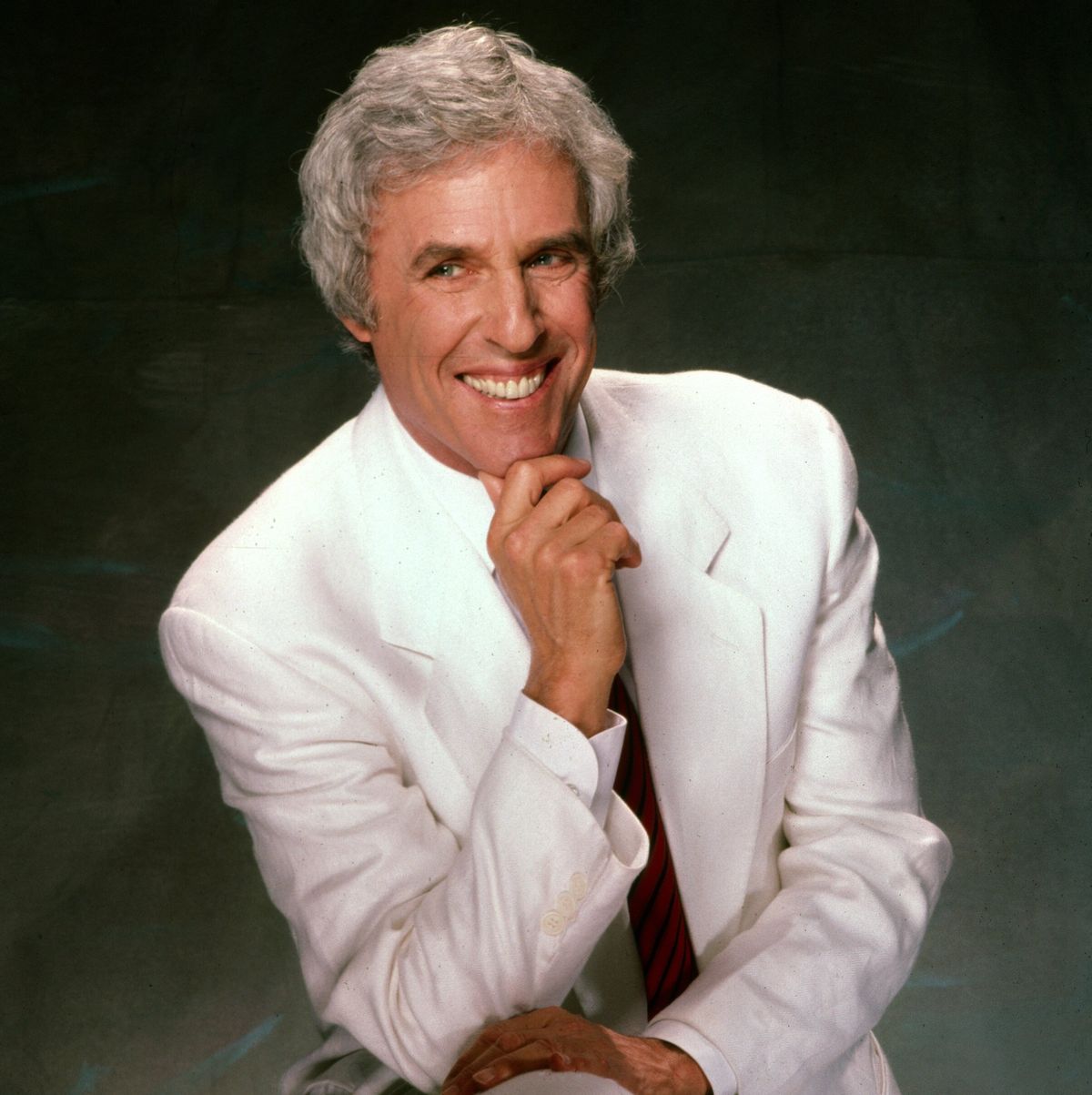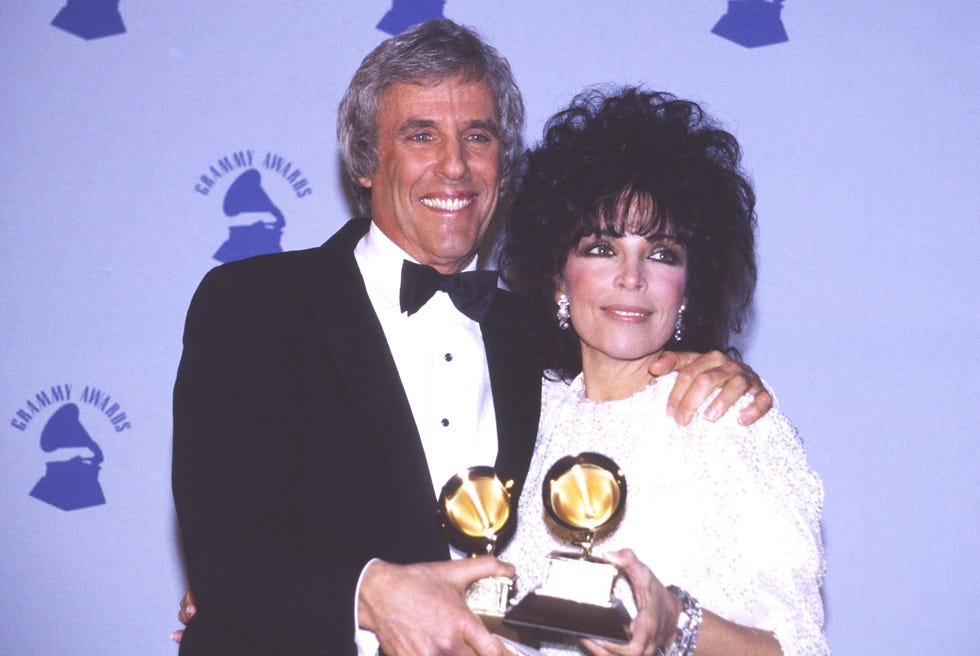https://www.biography.com/musicians/burt-bacharach
Lots of Backarach's music was played on the radio station my parents listened to growing up so there are many fond memories associated with it. He died from natural causes at 94. RIP
~~ recommended by newestbeginning ~~
Award-winning songwriter/composer Burt Bacharach was behind a wide array of hits, including “What the World Needs Now Is Love,” “I Say a Little Prayer,” “Raindrops Keep Fallin’ on My Head,” and “That’s What Friends Are For.”

Who Was Burt Bacharach?
Starting in the 1950s, Burt Bacharach found success as a songwriter, eventually working with Hal David to write a slew of hits for vocalist Dionne Warwick during the following decade. Known for creating tunes with gorgeous melodies, Bacharach wrote the popular Broadway musical Promises, Promises and worked on movie theme songs and scores, winning two Oscars for Butch Cassidy and the Sundance Kid. Bacharach also received six Grammys and, as a huge pop chart presence, saw his songs remade and sampled across a variety of genres. He died February 8, 2023, at age 94.
Quick Facts
FULL NAME: Burt Bacharach
BORN: May 12, 1928
DIED: February 8, 2023
BIRTH CITY: Kansas City, Missouri
SPOUSES: Paula Stewart (1953–1958), Angie Dickinson (1965–1980), Carol Bayer Sager (1982–1991), Jane Hanson (1993– 2023)
CHILDREN: Nikki, Christopher, Oliver, and Raleigh
ASTROLOGICAL SIGN: Taurus
Background and Early Career
Burt Bacharach was born on May 12, 1928, in Kansas City, Missouri, but was raised in New York City by artist/songwriter Irma Freeman and newspaper columnist Bert Bacharach. Initially encouraged by his mother, the young Bacharach studied music at the Mannes School of Music, McGill University, The New School for Social Research, and Music Academy of the West. After a stint in the U.S. Army—during which time he played piano and arranged music for a dance band—he embarked upon a career as a songwriter at the end of the 1950s.
Bacharach worked in the famous Brill Building, where numerous songwriters cranked out hits. There, the Jewish American composer wrote the music for Perry Como’s “Magic Moments” as well as “The Story of My Life” for Marty Robbins. He worked on those songs with lyricist Hal David, who would become Bacharach’s full-time partner in just a few years.
Dionne Warwick Hits
Bacharach served as Marlene Dietrich’s accompanist from 1958 to 1964, traveling with her on tour. The legendary actress and performer came to adore the burgeoning songwriter. Although the two had markedly different personas, Bacharach also began to work regularly with Hal David in the early 1960s. Around this time Bacharach heard backup singer Dionne Warwick perform with the soul group the Drifters. He was impressed by her talent and Warwick was soon interpreting many of the pair’s songs.
Between 1962 and 1968, Warwick took a whopping 15 Bacharach/David songs into the Top 40. Their collaborations included “Don’t Make Me Over,” “Anyone Who Had a Heart,” “Reach Out for Me,” “I Say a Little Prayer” (later made famous as well by Aretha Franklin), “Message to Michael,” “Do You Know the Way to San Jose?,” “You’ll Never Get to Heaven,” “Walk on By,” “Trains and Boats and Planes,” and “I’ll Never Fall in Love Again.”
Grammy and Oscar Wins
Bacharach and David next branched out into film, writing the theme songs for What’s New Pussycat? (performed by Tom Jones, amidst five out-of-sync pianos) and Alfie (by Cilla Black and later Warwick), with both title tracks receiving Academy Award nominations. Bacharach and David received their third Oscar nod for the sultry “The Look of Love,” as sung by Dusty Springfield for the cinematic spoof Casino Royale (1967).
Then in 1968, Bacharach received a Grammy for his instrumental arrangements on Alfie. The score for Butch Cassidy and the Sundance Kid (1969) earned Bacharach another Grammy as well as an Oscar. With David, Bacharach also won a second Oscar for the film’s easygoing theme song “Raindrops Keep Fallin’ on My Head,” as performed by B.J. Thomas.
Broadway Success: Promises, Promises
In addition to film work and hit songs, Bacharach and David wrote a 1968 musical: Promises, Promises, with the show’s book written by Neil Simon. Based on the Oscar-winning Billy Wilder film The Apartment (1960), Promises, Promises starred Jerry Orbach and Jill O’Hara and became a long-running Broadway success nominated for eight Tonys, winning two. The related album also received a Grammy.
The Sound of Burt Bacharach
Helping to define what would become popularly labeled as “lite” music, Bacharach established an enduring sound known for its complex time signatures, lush textures and affable, tender charms. Melody lines seem to come alive and float in the songwriter’s world, with the flugelhorn often appearing prominently. In 1968, Herb Alpert and the Tijuana Brass reached No. 1 on the U.S. charts with a song that arguably epitomized Bacharach’s style: “This Guy’s in Love With You.” Then in 1970, the Carpenters had a U.S. chart-topper with another trademark Bacharach/David tune, “(They Long to Be) Close to You,” the same year that the 5th Dimension reached No. 2 with the broken-heart song “One Less Bell to Answer.” Along with his continued success as a songwriter, Bacharach released his own album, Burt Bacharach (1971), which sold well. He was inducted into the Songwriters Hall of Fame in 1972. The next year, he released Burt Bacharach’s Greatest Hits album, which included the songs “I’ll Never Fall in Love Again,” “Close to You,” and “Rain Drops Keep Falling on My Head.”
More No. 1 Hits and Awards: 1970s and Onward
Bacharach’s success dimmed significantly as the 1970s progressed. Following a disagreement about royalties for Lost Horizon, a 1973 science-fiction movie musical starring Peter Finch that bombed at the box office, Bacharach ended his partnership with David. He also backed out of producing a Warwick album, with litigation among various parties ensuing and relationships deeply frayed for years. Bacharach’s album releases with A&M Records also didn’t fare well.
Although his collaboration with David was over, Bacharach eventually found success with different songwriting partners. In 1982, he won his third Academy Award for “Arthur’s Theme (Best That You Can Do),” as performed and co-written by Christopher Cross for the 1981 film Arthur, with additional writing contributions from Peter Allen and Bacharach’s third wife, Carol Bayer Sager.

Bacharach also co-wrote with Sager “That’s What Friends Are For,” a No. 1 success that raised money for AIDS research and featured the talents of Warwick, Elton John, Gladys Knight, and Stevie Wonder, earning Bacharach a fourth Grammy in 1987 as well. And he worked with Sager on Neil Diamond’s “Heartlight” and “On My Own,” a sorrowful No. 1 duet featuring Patti LaBelle and Michael McDonald. Additionally, Bacharach ultimately reunited with David when the two wrote a new song for Warwick, “Sunny Weather Lover,” for her 1993 album Friends Can Be Lovers.
Remakes and Reinterpretations
Bacharach wrote dozens upon dozens of hits that appeared in the top 40 in both the U.S. and U.K. Over time, classic Bacharach tunes (some of which wouldn’t jibe with more progressive notions around gender and romance) have been remade across a range of genres.
Isaac Hayes turned Warwick’s “Walk on By” into a smoldering, 12-minute tour de force, with his version eventually sampled by Beyoncé for her 2016 album, Lemonade. “Always There to Remind Me” became a top 10 synth-pop hit for British group Naked Eyes in 1983, while the Pretenders later covered “Windows of the World” for the soundtrack to the film 1969. “Don’t Make Me Over” and “Walk on By,” famed for Warwick’s slow-paced renditions, were turned into more uptempo, top 5 r&b jams for singer Sybil going into the 1990s. An instrumental version of “I Say a Little Prayer” was also sampled by U.K. soulster Omar on his tune “Syleste” from Best by Far (2001). And later, Dionne Farris, known for her top 5 hit “I Know,” worked on the 2014 album Dionne Dionne with musician Charlie Hunter, featuring acoustic covers of Warwick, Bacharach, and David tunes.
Appearing with Mike Myers in the ’60s-influenced Austin Powers (1997) introduced Bacharach and his music to a new audience. Bacharach also collaborated multiple times with fellow singer/songwriter Elvis Costello; together they won a Grammy for “I Still Have That Other Girl.” Costello worked on Bacharach’s album At This Time (2005), which also featured contributions from Dr. Dre and Rufus Wainwright. The instrumental album won Bacharach his sixth Grammy.
The music of Bacharach returned to Broadway in the new millennium. He and David saw their tunes featured in the short-lived musical revue The Look of Love in 2003, while Bacharach contributed music to The Boy From Oz, which premiered the same year and starred Hugh Jackman. A revival of Promises, Promises later hit the stage in 2010, with the new version starring Sean Hayes and Kristin Chenoweth. Then in 2012, President Barack Obama presented the Library of Congress Gershwin Prize to Bacharach.
Personal Life and Death
Known for being both a playboy and perfectionist, Bacharach was married four times, with the songwriter stating that his work generally took precedence over his relationships. His first wife was actress Paula Stewart, with Bacharach’s own mother warning Stewart against the union. He next wed actress Angie Dickinson in 1965, who had helped Bacharach secure the project What’s New Pussycat? The two divorced in 1980. His third marriage was to fellow songwriter Carol Bayer Sager, from 1982–91. Then in 1993, Bacharach wed ski instructor Jane Hanson, for whom he had left Sager.
With Dickinson, Bacharach had a daughter, Nikki. Born several months premature, she suffered from developmental problems and was diagnosed with Asperger’s syndrome later in her life. Nikki died by suicide when she was 40. Bacharach shared some of the pain surrounding her death in his autobiography, Anyone Who Had a Heart: My Life and Music (2013), with Dickinson providing a different perspective on the family trauma as well. He had three other children: a son Cristopher from his marriage with Sager and a son Oliver and daughter Raleigh from his fourth marriage.
Bacharach died at his home in Los Angeles on February 8, 2023. He was 94.
Quotes
- I’ve always believed if it’s a good tune people will find a way to move to it.
- My singing is very sparse. But it’s more about what I feel is the impact of being on stage and being able to meet people through your music. ... It’s about being able to have contact playing this kind of music. The pain that people go through—or the boredom, or the broken relationships, or the illnesses—music can be a powerful antidote sometimes. And you don’t get to see that just sitting in a room writing by yourself.
- [Dionne Warwick] had this great flexibility and was able to make things sound easier than they were in reality. She had an amazing fluidity. The more she could do, the more I could stretch musically.
- I’m not a good appraiser of the past. Those days are a blur. I wasn’t consciously trying to break any rules at the time. You are what you hear. It was probably my classical training that geared me to stretch and expand. I'd studied with Henry Cowell and Darius Mil haud. Brazilian music was a huge breath of fresh air for me.
- I wasn’t listening to top-40 radio. I didn’t like Bill Haley and the Comets. I didn’t like rock’n’roll per se. It was all a little too simplistic, harmony-wise, and those pure vanilla chords… It’s a very interesting thing, where that harmonic thing that stockpiled so much in my life came from, whether it was listening to Stravinsky’s Firebird or [Ravel’s] Daphnis et Chloé, the extraordinary richness of harmonies.
- I was a loner in high school. We had a little band and you’d get to meet girls that way. But I wasn’t doing too well. So the music helped. A little bit, but not much. The reality is that my basic love, all the way through, was the music.
No comments:
Post a Comment